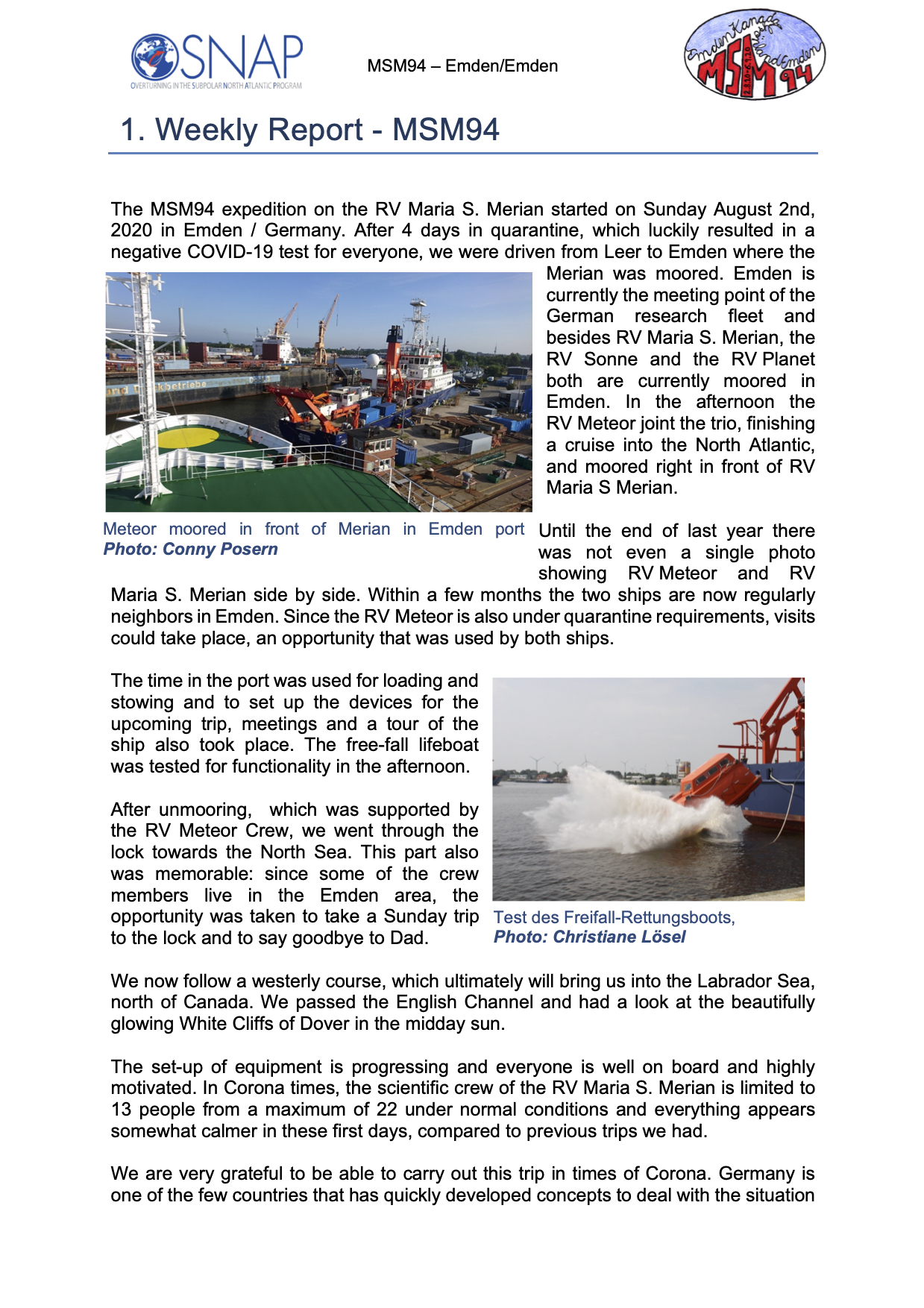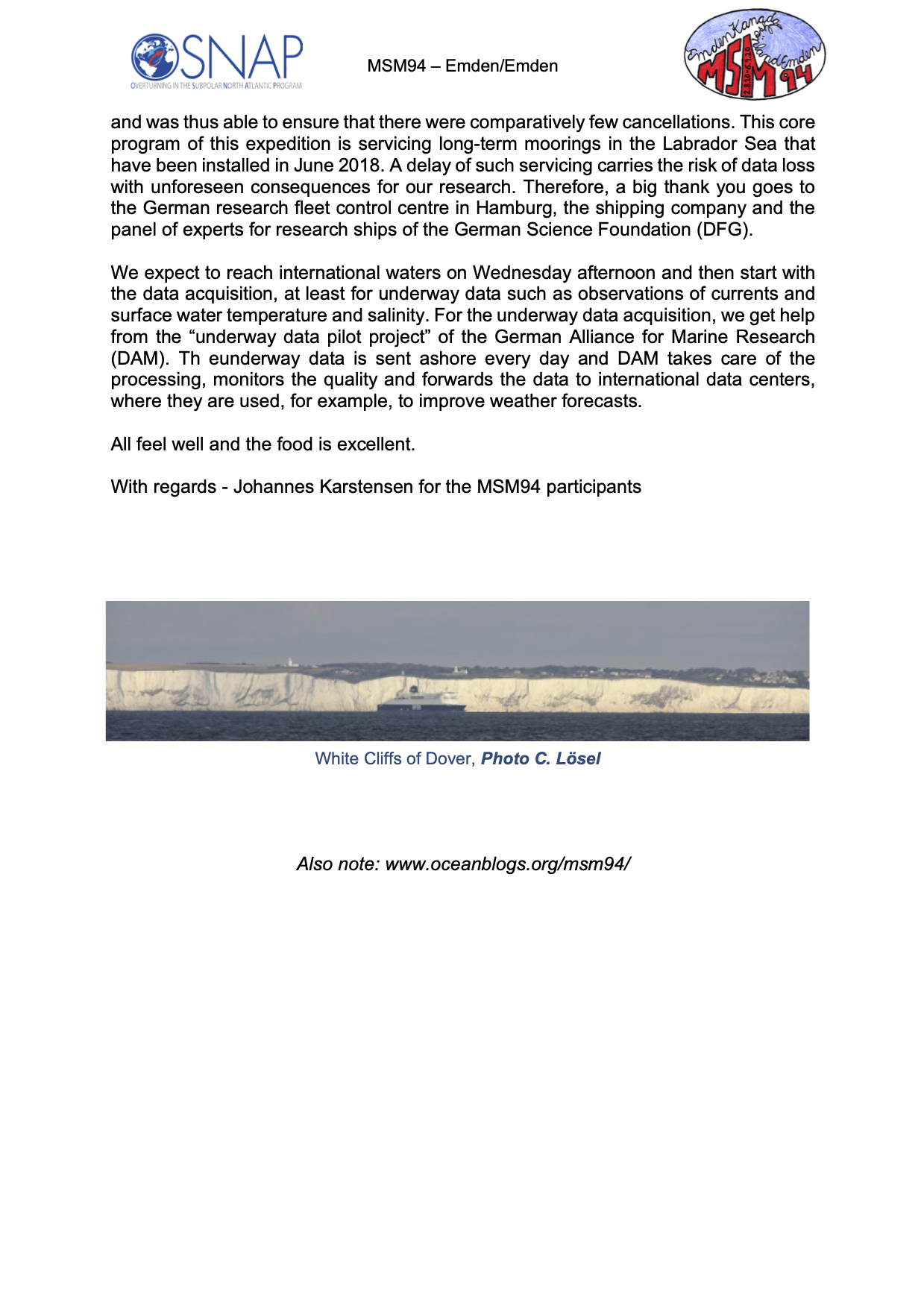OSNAP related presentations at EGU 2021 can be found on the site linked below. We look forward to ‘seeing’ everyone, and learning about the latest findings. If you have any edits or questions please contact Sarah Clem (sarah.clem@duke.edu)
Author Archives: Sarah
Postdoctoral Researcher in Climate Science at Georgia Tech
A postdoctoral position in climate science is available at the School of Earth and Atmospheric Sciences at Georgia Tech. The postdoctoral researcher will work closely with Dr. Susan Lozier on projects that aim to elucidate the atmospheric and oceanic processes that drive North Atlantic sea surface temperature variability on interannual, decadal and multidecadal time scales.
The initial term of the appointment will be 12 months, with the possibility of extension for another two years based on performance.
Job Responsibility: The individual will be expected to conduct independent, high-quality research in climate science; publish papers; and present work at national and international conferences. The researcher is also expected to work collaboratively with climate scientists at Georgia Tech and elsewhere on projects related to North Atlantic climate variability.
Qualifications: A PhD in atmospheric or oceanic science is required by the time of appointment. Strong quantitative and programming skills are expected and experience running—and/or analyzing output from—atmosphere or ocean general circulation models is desirable. Excellent organizational and collaborative skills are required and strong oral and written communication skills are expected.
Start date: On or about June 1, 2021.
Salary: Commensurate with the individual’s experience and education.
To apply: Interested individuals should send a CV, a one-page statement of research interest, and the names and contact information of at least 3 references to Belal Elnaggar at belnaggar3@gatech.edu. Review of applications will begin immediately and continue until the position is filled.
Georgia Tech, an institution of the University System of Georgia, is an equal education/employment opportunity institution and will not discriminate against any employee or applicant on the basis of age, color, disability, gender, national origin, race, religion, sexual orientation, veteran status, or any classification protected by federal, state, or local law and requires compliance with the Immigration Control Reform Act of 1986. Consistent with its obligations under federal law, each company that is a federal contractor or subcontractor is committed to taking affirmative action to employ and advance in employment qualified women, minorities, disabled individuals and veterans. Candidates with the skills and knowledge to productively engage with diverse communities are encouraged to apply.
Posted in Job Opportunities
Research Assistant in Physical Oceanography at Georgia Tech
A research assistant position in oceanography is available at the School of Earth and Atmospheric Sciences at Georgia Tech. The research assistant will work for Dr. Susan Lozier, the international lead for the Overturning in the Subpolar North Atlantic Program (OSNAP; www.o-snap.org). Specifically, the research assistant will work to support a number of projects focused on measuring and understanding the Atlantic Meridional Overturning Circulation.
The initial term of the appointment will be 12 months, with the possibility of extension for another two years based on performance.
Job Responsibility: The individual will be expected to analyze data, prepare high-quality graphics, contribute to peer-reviewed publications, assist with research progress reports, organize project meetings, maintain project websites, curate research data and perform administrative tasks such as scheduling and recording project meetings.
Qualifications: A B.S. or M.S. degree in a natural science is required by the time of appointment. Experience with statistical and graphical analysis of data is expected, as is an attention to detail. Excellent organizational and collaborative skills, and strong oral and written communication skills are expected.
Start date: On or about May 1, 2021.
Salary: Commensurate with the individual’s experience and education.
To apply: Interested individuals should send a CV and the names and contact information of at least 3 references to Belal Elnaggar at belnaggar3@gatech.edu. Review of applications will begin immediately and continue until the position is filled.
Georgia Tech, an institution of the University System of Georgia, is an equal education/employment opportunity institution and will not discriminate against any employee or applicant on the basis of age, color, disability, gender, national origin, race, religion, sexual orientation, veteran status, or any classification protected by federal, state, or local law and requires compliance with the Immigration Control Reform Act of 1986. Consistent with its obligations under federal law, each company that is a federal contractor or subcontractor is committed to taking affirmative action to employ and advance in employment qualified women, minorities, disabled individuals and veterans. Candidates with the skills and knowledge to productively engage with diverse communities are encouraged to apply.
Posted in Job Opportunities
Postdoctoral Researcher in Physical Oceanography at Georgia Tech
A postdoctoral position in physical oceanography is available at the School of Earth and Atmospheric Sciences at Georgia Tech. The postdoctoral researcher will work collaboratively on a number of projects focused on the Atlantic Meridional Overturning Circulation. Specifically, the postdoctoral researcher will work closely with Dr. Susan Lozier, the international lead for the Overturning in the Subpolar North Atlantic Program (OSNAP; www.o-snap.org), on the study of heat, freshwater and volume transports in the subpolar North Atlantic; deep water pathways throughout the Atlantic basin; the impact of subpolar dynamics on the variability of the meridional overturning circulation and the mechanisms governing that variability.
The initial term of the appointment will be 12 months, with the possibility of extension for another two years based on performance.
Job Responsibility: The individual will be expected to conduct independent, high-quality research in physical oceanography; publish papers; and present work at national and international conferences. The researcher will also work collaboratively with oceanographers at Georgia Tech and elsewhere on projects related to OSNAP. Opportunities for cruise participation as part OSNAP will be available.
Qualifications: A PhD in physical oceanography or a related field is required by the time of appointment. A background in large-scale oceanography is preferable and experience with observational and model data sets is desirable. Excellent organizational and collaborative skills are required and strong oral and written communication skills are expected.
Start date: On or about June 1, 2021.
Salary: Commensurate with the individual’s experience and education.
To apply: Interested individuals should send a CV, a one-page statement of research interest, and the names and contact information of at least 3 references to Belal Elnaggar at belnaggar3@gatech.edu . Review of applications will begin immediately and continue until the position is filled.
Georgia Tech, an institution of the University System of Georgia, is an equal education/employment opportunity institution and will not discriminate against any employee or applicant on the basis of age, color, disability, gender, national origin, race, religion, sexual orientation, veteran status, or any classification protected by federal, state, or local law and requires compliance with the Immigration Control Reform Act of 1986. Consistent with its obligations under federal law, each company that is a federal contractor or subcontractor is committed to taking affirmative action to employ and advance in employment qualified women, minorities, disabled individuals and veterans. Candidates with the skills and knowledge to productively engage with diverse communities are encouraged to apply.
Posted in Job Opportunities
Extended OSNAP overturning time series for 2014-2018
As revealed by the first 21-month record (2014-2016) from the OSNAP array [Lozier et al. 2019], the subpolar overturning occurs primarily in the eastern subpolar region of the North Atlantic Ocean. This finding contrasts the view of Labrador Sea variability dominating the overturning circulation variability across a range of latitudes via the southward propagation of density anomalies formed by convection in the basin interior. The small overturning in the Labrador Sea was surprising since there was strong convection in the Labrador Sea during the 2014-2016 winters. However, given the scale of the expected delay in the overturning response, the 2014-2016 time series may have been too short to pick up this response. In short, the signals in the Labrador Sea may take a few years to imprint on the OSNAP array.
Continuous observations from the OSNAP array are now available for a 4-year period. The 4-year time series (2014-2018) of the estimated overturning across the section is shown in the figure below. Here the strength of the overturning circulation is defined as the maximum of the streamfunction in density coordinates, and is estimated across the full array, OSNAP West (Labrador Sea) and East (eastern subpolar gyre between Greenland and Scotland), separately. As shown in Lozier et al. [2019], this decomposition allows us to make relative comparisons of the overturning contributions within the subpolar subbasins. Clearly, there is a consistent pattern throughout the records: the overturning circulation takes place primarily across the OSNAP East section in the eastern subpolar region. The extended time series proves the validity of the first 21-month record and supports a diminish contribution from the Labrador Sea, over the observational time scales.
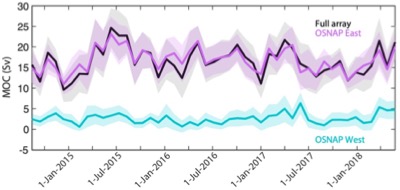
30-day time series of the strength of the meridional overturning circulation (MOC) across the full OSNAP array, and the OSNAP East and West sections, separately. Shading indicates the uncertainty in each 30-day estimate, obtained from Monte Carlo simulations. The 4-year mean MOC is 16.6 Sv# (uncertainty of 0.7 Sv; standard deviation of 3.5 Sv) across the full array, 16.8 Sv (uncertainty of 0.6 Sv; standard deviation of 2.8 Sv) across OSNAP East, and 2.6 Sv (uncertainty of 0.3 Sv; standard deviation of 1.2 Sv) across OSNAP West. # 1 Sv= 106 m3 s-1
Further analysis has been performed to assess the role of Labrador Sea and Irminger Sea convection in creating western boundary density anomalies in the region and the contributions of those boundary anomalies to the subpolar overturning variability [Li et al. 2020]. Results from this analysis shed light on the causes of North Atlantic overturning variability downstream from the subpolar region.
Of course, a question remains as to which subpolar basin(s) holds the key to the overturning variability over interannual and longer time scales. Needless to say, maintaining high-quality trans-basin observations is critical for tackling this question.
Finally, we are pleased to announce that all of the seven 2020 OSNAP cruises have been carried out successfully. Special thanks to the PIs from the observational groups who worked tirelessly in (re)planning the cruises to accommodate the extraordinary challenges caused by the pandemic. All cruises had to reduce their working time at the mooring sites because of the need for more transit time to and from their home port. All observational groups outperformed expectations: everyone was safe and the data return was superb. We also applaud the captain, the crew and everyone on the science teams! With all of these efforts, we will be adding another two years of transport estimates in 2021 without significant delays.
References
Lozier, M.S., F. Li, S. Bacon, F. Bahr, A.S. Bower, S.A. Cunningham, M.F. de Jong, L. de Steur, B. deYoung, J. Fischer, S.F. Gary, B.J.W. Greenan, N.P. Holliday, A. Houk, L. Houpert, M.E. Inall, W.E. Johns, H.L. Johnson, C. Johnson, J. Karstensen, G. Koman, I.A. Le Bras, X. Lin, N. Mackay, D.P. Marshall, H. Mercier, M. Oltmanns, R.S. Pickart, A.L. Ramsey, D. Rayner, F. Straneo, V. Thierry, D.J. Torres, R.G. Williams, C. Wilson, J. Yang, I. Yashayaev, J. Zhao, A Sea Change in Our View of Overturning in the Subpolar North Atlantic, Science, 363(6426), 516-521 (2019).
Li, F., M.S. Lozier, S. Bacon, A. Bower, S.A. Cunningham, M.F. de Jong, B. deYoung, N. Fraser, N. Fried, G. Han, N.P. Holliday, J. Holte, L. Houpert, M.E. Inall, W.E. Johns, S. Jones, C. Johnson, J. Karstensen, I.A. LeBras, P. Lherminier, X. Lin, H. Mercier, M. Oltmanns, A. Pacini, T. Petit, R.S. Pickart, D. Rayner, F. Straneo, V. Thierry, M. Visbeck, I. Yashayaev, C. Zhou, Subpolar North Atlantic Western Boundary Density Anomalies and the Meridional Overturning Circulation, submitted to Nature Communications (2020).
Posted in News
Transiting to the Irminger Sea
by Sarah Nickford, URI
Greetings from the R/V Neil Armstrong! I am a graduate student studying physical oceanography at the University of Rhode Island’s Graduate School of Oceanography. Originally, I planned on participating in the OSNAP-23 cruise to help calibrate and deploy oxygen sensors on some of the OSNAP moorings in the Labrador Sea as part of the newly funded Gases in the Overturning and Horizontal circulation of the Subpolar North Atlantic Program (GOHSNAP) awarded to my advisor, Dr. Jaime Palter, and her collaborators.
In the midst of the pandemic, I suddenly became an alternate for that cruise as science parties were slashed in half. After completing the 14-day self-isolation as an alternate, the entire science party tested negative for COVID-19 (phew) and the R/V Neil Armstrong began its voyage to the Labrador Sea. I resumed my “normal” pandemic day-to-day life until one morning, not long after, I was asked if I would be willing to complete another self-isolation period to be able to go to the Irminger Sea as a Hydrographer for the next OSNAP cruise. This cruise was a joint venture between OOI and OSNAP, with both OOI Irminger Node and OSNAP mooring turn-arounds. I had about a day to make a decision. Fond memories of my month aboard the SSV Corwith Cramer crossing the North Atlantic with Sea Education Association (SEA) helped me make up my mind. Ever since that voyage, I’ve been drawn to going to sea, where there is no land in sight. So, when the opportunity presented itself, I was eager to help out. I immediately was trained in Woods Hole and after the weekend, I entered my second self-isolation period of the summer. As I learned more about the cruise activities, I became increasingly excited. I suddenly had the opportunity to learn how to collect water samples, watch mooring turn-around operations and help document them, watch glider deployments, and help deploy an Argo float.
After the science party completed their 15-day self-isolation period, we finally arrived and settled into the R/V Neil Armstrong. We left Woods Hole, MA on Saturday August 8th at 0815 and the science team has been busy planning mooring operations, CTD deployments, and water sampling. Today is the fifth transit day and we are just past Canada, making a sharp turn north and heading to the Irminger Sea. So far, we’ve had incredibly clear skies in the evenings, creating the perfect conditions for beautiful sunsets and vibrant stargazing (great for viewing the Milky Way and the Perseid meteor shower!).
The first bit of science was on Saturday afternoon when we did a shallow water CTD cast to test how the CTD and associated machinery were working and so that the OSNAP Chief Scientist, Heather Furey, and I could practice water sampling. We have been orienting ourselves in the wetlab onboard and developing a sampling plan that fits the needs of both the OSNAP project and the OOI Irminger Array. After a CTD comes back on deck, we will be collecting water samples for the following parameters: dissolved oxygen, salt, DIC/TA, pH, nutrients, and chlorophyll. Each sample is taken at a specified depth, which can change depending on the water mass characteristics that we are sampling. We plan to do a CTD cast near each of the OSNAP moorings. This is useful for the calibration of the instruments on the new moorings and for what is called a “post-recovery caldip,” where the instruments from the recovered mooring are strapped to the CTD frame for one final dive to detect possible sensor drift over the two years they lived underwater collecting data. As we continue our transit, we are looking forward to the excitement that is soon to come.
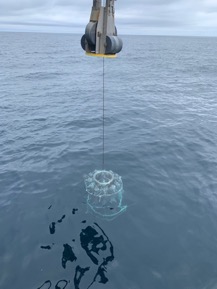
A CTD just below the surface of the water. Before sending the CTD to the depths of the ocean, it must sit at the surface so that the instruments equilibrate with the surrounding water. After reaching its target depth, on its way back up to the surface, scientists monitoring the CTD close individual bottles at specified depths, capturing a sample of water from different water masses.
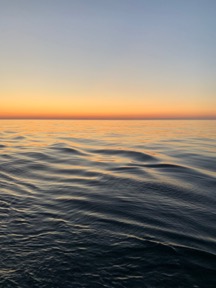
Reflections of the dwindling daylight on the surface of the ocean after departing Woods Hole.
Posted in Cruises
OSNAP/NIOZ Cruise Blog
OSNAP scientist, Femke de Jong, and a team of NIOZ scientists are currently at sea on a research cruise aboard the RV Pelagia. They will be servicing moorings and deploying drifters in the Irminger Sea. Follow their progress on the cruise blog posted here.
OSNAP at Ocean Sciences Meeting 2020
If you’re at Ocean Sciences this week, and curious to learn more about ongoing OSNAP research, there are numerous opportunities. Follow the link below to find a list of oral and poster presentations featuring OSNAP related topics:
Posted in Meetings
Postdoctoral position – IFREMER
Applications for an 18-month postdoctoral position are invited from candidates with a recent PhD in physical oceanography or similar. The successful candidate will be based in IFREMER, Brest (France), and will join the“Ocean and Climate” team of the Laboratory of Physical and Spatial Oceanography (LOPS).
As part of the European project H2020 Euro-Argo RISE, the proposed work will combine newly available Deep-Argo profiles (Figure) and other observational datasets to obtain a better quantification and understanding of NADW intra-seasonal to decadal variability in the Irminger Sea. In parallel, the quality of Deep Argo data will be evaluated through an inter comparison of three different deep sensors mounted on a single three-headed float (Figure). On top of informing on the variability of the abyssal North Atlantic and its causes, these activities will provide a significant valorization of the Deep Argo dataset as well as crucial recommendation to the international community on technological choices for the global extension of the network.
Contract duration
18 months (open until filled)
Requirements
- PhD in physical oceanography or related discipline (meteorology, applied mathematics)
- Experience in analysis of observed data sets and/or model outputs
- Good programming skills (Matlab, Python, or equivalent).
- Skills in writing peer-reviewed scientific papers (English)
Interested candidates should send the following documents to damien.desbruyeres@ifremer.fr andvirginie.thierry@ifremer.fr: Curriculum Vitae (including publication record), a statement of previous research and motivations for the present project, and contacts of at least two referees). Candidates must be within 6 years after PhD defense and must not have been employed as a postdoctoral fellow by Ifremer before.
Starting date before 31st December 2019
Posted in Job Opportunities
